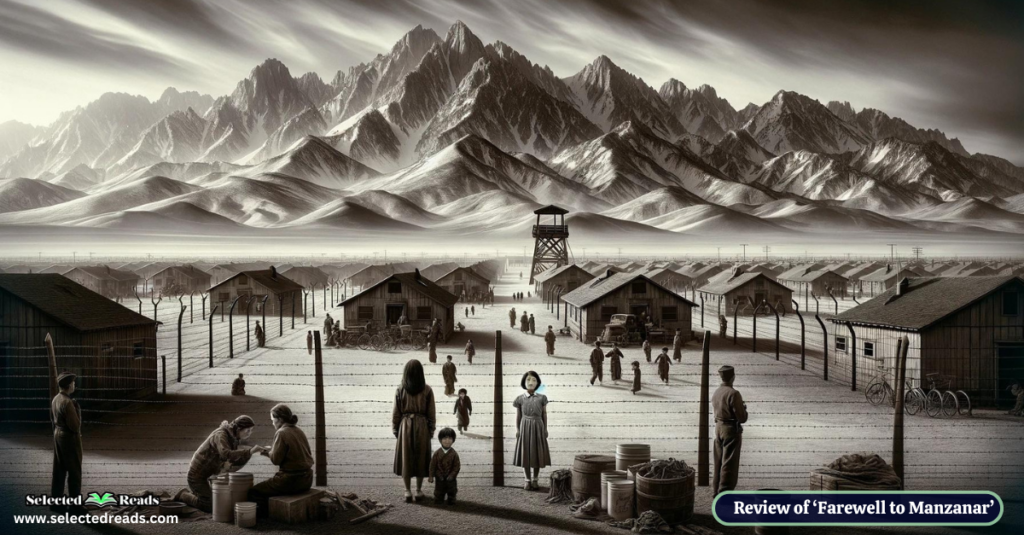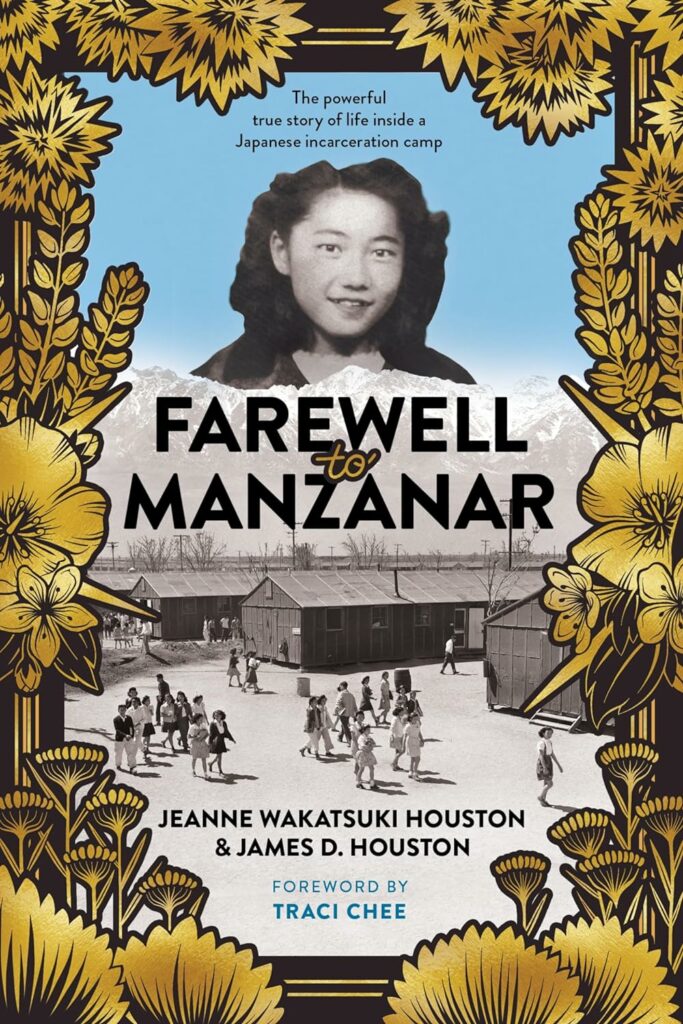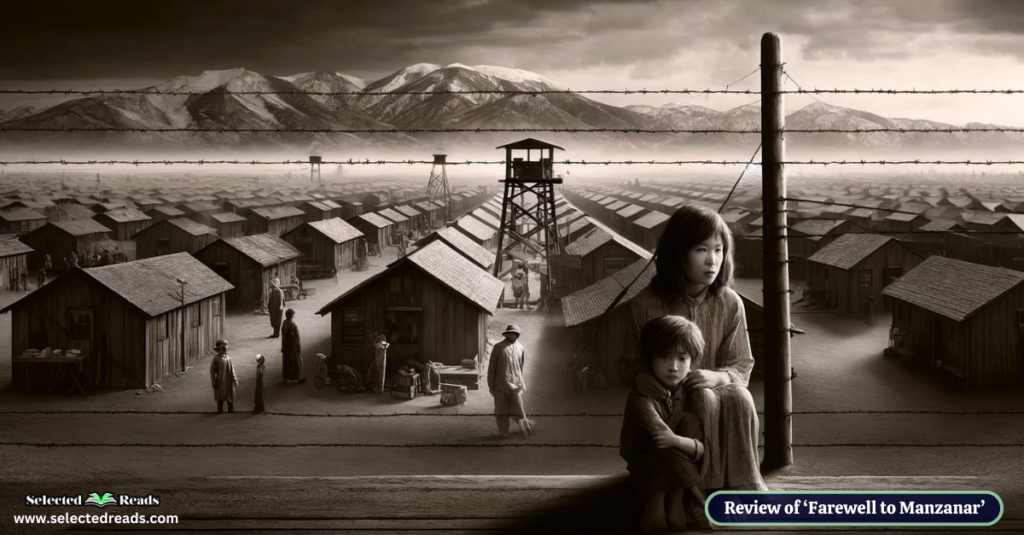Today, we delve into “Farewell to Manzanar” by Jeanne Wakatsuki Houston and James D. Houston, a memoir that holds a significant place within the genre of historical non-fiction. This reflective work offers an intimate look into the lives disrupted by the internment of Japanese Americans during World War II.
The aim of this post is to give readers a thorough overview of the memoir’s content and its poignant messages, all the while keeping crucial plot details unrevealed for those who wish to experience the book firsthand. Our discussion will unfold in three parts: initially, I will summarize the story to set the stage for further exploration.
Following that, we will delve into the dynamics of the main characters, examining how they navigate their challenging circumstances. To conclude, I will pose several thought-provoking questions designed to stimulate deeper analysis and discussion, ideal for book clubs or personal contemplation.
Farewell to Manzanar Summary
“Farewell to Manzanar” by Jeanne Wakatsuki Houston and James D. Houston is a poignant memoir that offers an intimate glimpse into the life within a Japanese American incarceration camp during World War II. The story unfolds through the eyes of Jeanne Wakatsuki, a young girl when she and her family are uprooted from their home and sent to Manzanar, one of the ten camps where over 110,000 Japanese Americans were confined.
The memoir begins with the arrest of Jeanne’s father, a fisherman accused of spying for Japan after the attack on Pearl Harbor. His arrest and subsequent imprisonment cast a shadow over the family, setting the tone for the disruption and heartache that follows. Jeanne, her mother, and her nine siblings are transported to Manzanar, located in the desolate high mountain desert of California. Here, the Wakatsuki family tries to make sense of their new, harsh reality.
Photo: Amazon
Life in Manzanar is fraught with challenges. The camp, crudely constructed with inadequate facilities, is surrounded by barbed wire and watchtowers. The residents, most of whom are American citizens, endure extreme weather conditions, chronic overcrowding, and a lack of privacy. Jeanne describes how each family is allotted a single room, regardless of size, and how they struggle to maintain dignity under such oppressive circumstances.
Despite these conditions, the Japanese American community attempts to create a semblance of normal life. Jeanne recounts how schools were established, and people engaged in jobs, sports, and arts. She reflects on her own experiences growing up in the camp, marked by a mix of typical childhood activities and the constant, looming presence of injustice.
The memoir also explores the psychological and emotional impact of incarceration on Jeanne and her family. She speaks of her father’s transformation from a proud fisherman to a disillusioned man, broken by his inability to provide for his family. The strain on her parents’ marriage and the shifts in family dynamics provide a deeply personal view of the toll that such imprisonment took on familial relationships.
As the war ends, the camp closes, and the Wakatsuki family is released. However, freedom brings its own set of challenges as they struggle to reintegrate into American society. Jeanne faces discrimination and the struggle to reconcile her dual identity as both Japanese and American.
“Farewell to Manzanar” not only recounts the day-to-day survival of a young girl and her family but also serves as a sobering reminder of the fragility of civil liberties in times of crisis. Through her narrative, Jeanne Wakatsuki Houston provides a vivid record of a grievous chapter in American history, told with the innocence of a child and the insight of an adult reflecting back on her formative years. The memoir remains a vital text for understanding the consequences of prejudice and the resilience of the human spirit.
Farewell to Manzanar Characters
Each character brings depth to the story by offering different perspectives and emotional responses to their incarceration during World War II. Here’s a brief look at some of the key characters in the memoir:
- Jeanne Wakatsuki – Jeanne is the protagonist and narrator of the memoir. She is seven years old when her family is sent to Manzanar. Through her eyes, we see the day-to-day life and challenges in the camp, as well as her personal growth and identity struggles as a Japanese American girl.
- Papa (Ko Wakatsuki) – Jeanne’s father, Ko, is a significant figure in her life and the story. He is arrested and detained separately from the family at the beginning of the story for suspicions of disloyalty to America. His experiences, including his time in solitary confinement, deeply affect him and change his personality, casting a shadow over his relationship with his family upon his return.
- Mama (Riku Wakatsuki) – Jeanne’s mother, Riku, is a source of strength for the family. She manages to hold the family together under the dire circumstances of life in the camp. Her resilience in the face of adversity is a critical anchor for the family.
- Woody Wakatsuki – Woody is one of Jeanne’s older brothers, who represents the theme of loyalty and pride in heritage. Despite the family’s unjust treatment, Woody remains patriotic and eventually serves in the U.S. Army, reflecting the complex feelings of duty and honor prevalent among Japanese Americans during the war.
- Radine – A friend of Jeanne’s outside the camp, Radine symbolizes the life that Jeanne yearns for but feels she cannot fully achieve because of her Japanese heritage. Their friendship highlights the racial and cultural barriers that Jeanne experiences.
- The Wakatsuki siblings – Jeanne’s siblings also play roles in showing how the incarceration affected young Japanese Americans differently, depending on their age and personality.
Farewell to Manzanar Discussion Questions
Creating discussion questions for “Farewell to Manzanar” can help deepen readers’ understanding of the memoir and facilitate insightful conversations about its themes and historical context. Here are some thought-provoking questions that could be used in a book club, classroom setting, or among readers interested in exploring the book’s complex issues:
- Identity and Assimilation: How does Jeanne struggle with her identity throughout the memoir? Discuss the ways in which the incarceration impacts her sense of self and her feelings of belonging to American society.
- Family Dynamics: How do the experiences at Manzanar affect the Wakatsuki family dynamics? Consider the changes in Papa’s role and the tensions that arise within the family. How does the family cope with these changes?
- Historical Context: What does “Farewell to Manzanar” reveal about the American government’s policies towards Japanese Americans during World War II? How does the memoir contribute to our understanding of civil liberties in times of crisis?
- Resilience and Adaptation: In what ways do the residents of Manzanar demonstrate resilience and adaptability? Discuss specific instances where the community comes together to overcome the harsh conditions of the camp.
- Discrimination and Prejudice: How does the memoir address issues of racism and prejudice, both within and outside the camp? Consider the interactions between the Japanese Americans and the wider community, including after the war.
- The Role of Memory and Storytelling: How does Jeanne use storytelling and memory to reclaim and understand her past? Discuss the importance of storytelling as a way to preserve history and personal identity.
- Impact on Future Generations: What might be the long-term effects of the incarceration on Jeanne and her family? Consider how the experiences of older and younger generations differ.
- Symbols and Motifs: What symbols and motifs does Jeanne use to enhance the narrative? How do elements such as the dust storms, the ocean, or the barrack settings contribute to the overall theme of the memoir?
- Comparison with Other Historical Narratives: How does “Farewell to Manzanar” compare to other personal narratives from history that involve confinement or persecution, such as the Holocaust or Apartheid? What universal themes emerge from these narratives?
- Lessons for Today: What lessons can contemporary society learn from “Farewell to Manzanar” about tolerance, justice, and the protection of civil rights? How can these lessons be applied in today’s political climate?
Related: Born A Crime Summary and Main Themes
Final thoughts
To conclude, I hope this brief exploration has piqued your interest in “Farewell to Manzanar.” This memoir is a deeply moving account that sheds light on a pivotal yet often overlooked chapter of American history. If you haven’t had the chance to read it yet, I strongly encourage you to do so, as it offers invaluable perspectives on resilience, identity, and the consequences of prejudice.









